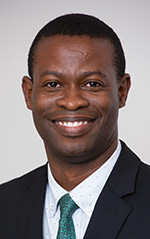A Key to Success: Engaging Civil Society
Civil society organizations, viewed with skepticism in some African countries and slighted at the summit, can play a vital role in development efforts.
BY KEHINDE TOGUN AND MARIA KISUMBI
In December 2022, the Biden-Harris administration hosted the U.S.-Africa Leaders Summit—the first such convening of African heads of state in the United States since 2014. The summit occurred against the backdrop of the administration’s new Africa strategy, released in August 2022, which seeks to reframe U.S.-Africa relations as a partnership. It also seeks to move away from the perception of Africa as a pawn in the United States’ strategic competition with China. With the strategy and the summit, the administration has been intentional about leaving behind decades of finger-wagging at African leaders and a Western “savior” mindset toward African people.
Instead, the summit sought to create opportunities for African leaders to engage on equal footing with U.S. government officials. The administration also made several meaningful commitments to the continent, as well as “smaller” initiatives likely to pay positive dividends: to strengthen African democratic transitions, to improve civilian oversight of the security sector, and to increase labor rights for women in the workplace. There were also significant deals brokered between African governments and the U.S. private sector.
The vast majority of participants and observers agree that the summit was more substantive and more successful than many of us anticipated. Of course, the true measure of success isn’t the number of promises made. It’s how well the administration honors its commitments, as well as how many benefits African citizens are able to reap as a result of the summit and the agreements coming out of it.
In that regard, the summit’s biggest failing is of great concern because it could imperil the very success the administration is after. Despite all the pomp and circumstance surrounding the event, African civil society and civil society organizations (CSOs) in the U.S. working on Africa were largely sidelined.
A Critical Failing
No doubt there was an effort to include civil society. The first day of the summit included a civil society forum hosted at the United States Institute of Peace (USIP) with lots of interesting conversations. That forum was held in parallel with other events at the Walter E. Washington Convention Center (the main summit location), including African youth and diaspora forums. Because each event was by invitation only, the vast majority of Africa-focused civil society representatives were invited exclusively to the civil society forum at USIP. Instead, many civil society organizations ended up hosting their own side events to elevate their specific issues. Ultimately, it seemed the African civil society leaders—the ones who will hold their governments accountable for ensuring citizens benefit from the summit commitments—were cordoned off in one building (at USIP) while most of the action happened at the convention center.
Further, several of the important events, including a Peace, Security, and Governance Forum—also on the first day—featured African heads of state talking at the audience instead of having a real dialogue. The Business Forum on the second day was a company-to-government affair, with little effort to allow civil society in the room or to know what deals were being made, much less offer input or introduce concerns of the constituents they represent.
In an era of shrinking civic space on the African continent, the inadequate platforming of civil society was a missed opportunity.
In an era of shrinking civic space on the African continent, the inadequate platforming of civil society was a missed opportunity. In a number of African nations, laws and regulations are being enacted to restrict CSOs’ operations and fundamental human rights; civic engagement and freedom of speech are also undermined, and CSO leaders and activists face frequent arrests and attacks. In addition, some African governments view civil society with general suspicion and skepticism.
The summit could have been an opportunity for the U.S. to emphasize to African heads of state the importance with which we view civil society engagement and the need to promote a conducive environment for CSOs to meaningfully participate in domestic and regional policy processes. Finding ways to include civil society on the same stage as African heads of state during these high-stakes events can help send a message that the U.S. believes they’re an essential part of the governance architecture.
Admittedly, planning a summit is hard, and the administration was never going to please everyone. Many Africa experts hope that the U.S.-Africa Leaders Summit becomes a regular occurrence and that it doesn’t take another decade for the next one. Ideally, in the future the U.S. administration will treat civil society as an equal leg of the stool, along with the private sector and government. This can be done by strengthening CSO engagement prior to future summits. For example, in advance of this summit, our organization, Humanity United, partnered with Amnesty International USA and the National Democratic Institute to co-chair a working group of Africa-based and Africa-focused CSOs in the U.S., representing the different regions within the continent.
This diverse group of organizations remains willing to find ways to continue collaborating more closely with various U.S. government entities. The group also released a series of recommendations on areas in which the administration should focus its engagement with the continent, including democratic governance, rule of law, human rights, African futures, and shared prosperity.
Form a Brain Trust, Prioritize Human Right
Beyond the summit, U.S. embassies in Africa and the African Union Economic, Social and Cultural Council can play their own parts in identifying community- and national-level African CSOs that can form a brain trust as advisory partners. Such a brain trust can contribute toward shaping the agenda for future engagements, help identify which elements of the current commitments would yield the greatest success, or what aspects of current commitments are most lacking and need bolstering to garner support from their respective constituents. Establishing these kinds of brain trusts will contribute toward fostering and consolidating partnerships between the U.S. government, African leaders, and CSOs—and thereby create opportunities for dialogue as the summit moves to implementation.
The lack of emphasis on human rights was another failing of the December summit. Prioritizing human rights, a principle the Biden-Harris administration has rhetorically championed, seemed a tertiary concern. In particular, when President Biden has photo ops with African dictators and the U.S. Secretary of State is seen shaking hands with the Ethiopian prime minister, whose government was until recently carrying out war crimes at home, the U.S. is sending an unfortunate, albeit perhaps unintentional, message.
The message that trade and investment trumps human rights violations will only make it harder for the U.S. to achieve its goal of having Africa succeed.
The message that trade and investment trumps human rights violations will only make it harder for the U.S. to achieve its goal of having Africa succeed and creating a true partnership. The Biden-Harris administration’s 2022 National Security Strategy places a global political order built on respect for universal human rights, and a global economy that provides opportunity for all, as fundamental to its national security interests. This means that beyond the fanfare of summitry, Foreign Service officers (FSOs) who represent the United States abroad must continue to have these conversations at post and emphasize to their counterparts that trade and investment in Africa will thrive only when there is good governance that includes solid human rights protections.
We all acknowledge that senior U.S. officials will visit countries—and meet with their leaders—where human rights records are questionable. However, arranging for these senior officials to also meet with civil society leaders and human rights defenders in the country makes a statement that the U.S. government takes them seriously. It also bolsters activists’ efforts in the long term if they’re in environments where they can safely seek meetings with their own government officials.
There’s no doubt that the State Department does a lot to support activists behind the scenes. Many of them tell us they would also like to see the U.S. more vociferous in public support. During the summit, for example, along with some other civil society organizations (e.g., Amnesty International USA, Human Rights Watch, and Project on Middle East Democracy), we held a daylong “Africa Human Rights Leaders Summit.” The bravery with which these activists carry out their work is inspiring. Each of them said the U.S. government is an effective listener but doesn’t act often enough on their requests. In this area, FSOs and colleagues in Washington, D.C., can better triangulate what actions would be most effective. They can also use the civil society in Washington to better understand nuances and what levers our partners on the ground are seeking to have the U.S. government pull.
Toward a Full Partnership
As the dust settles on the summit, it would also be useful for FSOs to become intentional about supporting multisectoral dialogue outside embassy walls. This kind of dialogue can catalyze partnerships that are intended in the spirit of the National Security Strategy and the U.S.-Africa Strategy. They can also help bring greater clarity on private sector commitments to the respective African governments. Taking these actions now and before the next summit might strengthen CSO engagement with businesses that could pay dividends in the business forum of future summits. So, too, would the United States being explicit about ensuring that human rights protections are built into trade and investment discussions.
We hope the Biden-Harris administration continues efforts to prioritize Africa in a way that includes African people and not only their elected leaders. A full partnership would fully embody the “Africa Matters” mantra, and a multisectoral approach can help ensure success of the various commitments the U.S. has and will make to the continent.
When sharing or linking to FSJ articles online, which we welcome and encourage, please be sure to cite the magazine (The Foreign Service Journal) and the month and year of publication. Please check the permissions page for further details.
Read More...
- “Supporting Civil Society in the Face of Closing Space” by Mariam Afrasiabi and Mardy Shualy, The Foreign Service Journal, May 2018
- “Biden and Harris’s Reset for Africa” by Kehinde Togun, Foreign Policy, November 2020
- “What the Tunisian Revolution Taught Me” by Gordon Gray, The Foreign Service Journal, January-February 2021
- “Maintaining Momentum After the U.S.-Africa Leaders Summit” podcast, Center for Strategic & International Studies, January 2023




